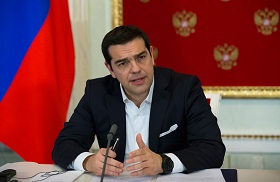The January 25, 2015 could be perceived as a milestone for both Greek and European political reality. If we take as a given that the eurozone crisis is a problem with many international implications, we will understand that Syriza party is something new within the international system. The important issue is the interaction among the key actors of this negotiating process. What are the problems that provoke interstate conflict? Why the variables of the so-called “Greek issue’’ do not result in a win-win solution?
Greece’s Targets and the Poisonous Problems
It really does not matter whether Greek Minister of Finance uses the game theory or not. The issue that matters is that game theory defines every negotiating form. States, like people, either fight or cooperate. In politics, we always try to achieve results but we evaluate them through the bipolar prism of costs and benefits. Greece has three main goals to achieve. The first one is to sign an agreement in which the stipulations would be more flexible than in the previous ones, this will help get resources for its economic growth. In the meanwhile, Athens tries to persuade the states and the institutions to provide a haircut on its debt. The third main goal is to implement these two by creating a political stability in which economic growth is the most viable issue.
After six years of economic depression, Greece underlines that its economic incapacity has been misperceived by its partners. The European states and especially Germany have been regarding the Greek issue as a “special circumstance”, especially after PSI. Is Greece a special circumstance? And on what terms? Typically Greece belongs to the club of developed countries. The paradox with Greece is that its present rates and statistics remind those of an African country. The humanitarian crisis is not a method that is used from the Greek side to coerce its partners. Unemployment remains stable and vacilates between 26% and 28%. Wages per capita have already reduced by almost 30%. Moreover the taxation policy that institutions impose on Greece leads to the reduction of value of most wages. Moreover, a great number of Greek citizens has to pay their private debts. Combining those problems with the Greek debt (180% of GDP) the Greek issue is not only a special circumstance but also, a calamitous fiscal cocktail.
The German View
Germany is without a doubt the most powerful state in the E.U. and within the eurozone. A few weeks ago George Friedman published an article “The Grexit Issue and the Problem of Free Trade” where he supports the idea that the Greek problem is deeper than it seems (a fiscal and debt crisis). According to the article, Germany’s commercial policy restricts the comparative advantage that is the vital actor of the free trade. To understand Germany’s eminence on austerity, we should follow its interests.
Germany, after 1990-s managed to avoid the mistake a lot of western states made. Berlin sustained its productivity and continues with its industrial dynamic. It was rational to take advantage of the European Economic Union and to boost its exports. Greece’s economy is depended on tourism and agriculture. The economic rationality drives us to the following idea: Germany, France and the other eurozone states insist on the concept that Greece should pay back the massive loans that it took. After that, Greece should be driven by the credit program to boost its comparative advantage in tourism and agriculture. From there on, we should observe the irrational German economic plan.
Berlin’s vital interests have to do a lot with Germany’s economic goals. Firstly, its leaders are interested in keeping the low inflation rate. Secondly, Germany tries to maintain the viability of the eurozone structure because the common currency boosts its exports. The Berlin’s temporary economic blooming calls for endurance so the German government tries to pursue the policy of austerity in E.U. periphery. After all, Germany desires to preserve the IMF’s leading role in the euro-crisis because it holds all the available instruments and techniques needed.
Three Special Factors that Drive Negotiation Process
From the very start of the crisis, the German government tried to persuade German citizens that Greece is a totally corrupted state. Moreover, the rhetoric that was expressed by some German media, was presenting Greeks as lazy people that want to live at the expense of the Community’s money. On the other hand, in Greece, Syriza’s election campaign was based on promises that were impossible to be part of reality in a quick and direct way.
In other words, Greek and German governments have lost a great asset that could save the negotiation process. At the moment, neither the Greek government nor the German one can step back from their original positions. So, in a way, we have a “self-imposed” chicken game. Thomas Schelling, one of the best known strategists and game theory analysts, expressed the following idea: “…We must focus on one –at least- common interest that both sides recognize as their main benefit, even if that benefit is to avoid a mutual destruction” . Keeping the eurozone alive is the unique benefit for all the actors.
The second factor that is driving the negotiation process to a conflict is systemic. In the E.U. there are many factors that are causing serious problems concerning its unification. Euro-skeptics already have a loud voice in European politics. The impact of internal crisis on the European history is not new. The new context of those crises is that some societies prefer the leftist euro-scepticism while others express support for radical right parties. All of these parties have a common agenda about the debt issues. The German government, even if it makes a decision to grasp its internal political cost, it must build a strategy of deterrent fame for the other European states that face similar problems with Greece. Given the benefits of Greece, it means that states like Italy, Spain and Portugal, are going to ask for more flexible measures. On the other hand, the “admit nothing-rhetoric” of Berlin could drive to a calamitous results for the eurozone.
The third important factor is the IMF's stance. IMF's main target is the maintenance of international financial stability. Meanwhile, the IMF acts as the global lender of last resort and therefore is interested in the repayment of the money it lends. On the initial stage of the Greek memorandum, some IMF actors (mainly Dominique Strauss-Kahn) proposed a haircut of the Greek debt, a solution that was rejected under pressure exerted mainly by French and German banks that would lose billions of euros in such a case. While IMF is an institution that supports the implementation of liberal reforms -such as those demanded by other creditors of Greece- at the same time exercises discreet pressure in Germany towards a debt restructuring. This negotiating tug eventually causes delays in finding a final solution, bringing closer the Grexit. To calculate the precise cost of a Grexit is impossible, but below we underline the main impacts of such a development.
Grexit: Economic Implications for Greece
Grexit will cause a short-term financial panic in the country. Banks and ATM’s will remain closed for few days in order to avoid bank run while capital controls will be imposed to stop a rush of money out of the country. Thereafter, there will be two possible implications for the Greek financial system: either the EU will decide to support Greek banks in order to avoid a social chaos in the country or it will leave the Greek banking system to its luck. In the second case, the Greek banks will have to operate without the Eurosystem ELA help and some of them are going to bankrupt. For the first weeks transactions will be made in euros and with the help of electronic cards or IOU’s (informal documents acknowledging debt). A dual currency system can be applied as the government has to pay wages, pensions and debts to private companies until the printing of the “new drachma” will be completed (this will take a couple of months).
Inflation will skyrocket causing shortages of staple goods and the severe devaluation of the new currency. A black market of euros will be created due to the lower value of the new drachma, leading to the creation of a dual-type economy (one for the rich people who will hold euro and the other for the poor who have drachma). The national debt will blast off but it could not be repaid and a large part of it will be restructured. Gradually, the Bank of Greece will apply a loose monetary policy trying to ease unemployment and depression. Finally, after a period of about 10-12 months, the currency rate and inflation will be stabilized and the economy may begin to rise again. This could happen only if Greece manages to attract foreign direct investments through low production costs, a new taxing system and a relatively virgin business environment that will help the country to gradually develop its own autonomous productive base.
Grexit: Economic Implications for EU and the Rest of the World
The economic impact that a Grexit could cause to the EU and the rest of the world is a matter of great dispute. Quantitative estimates vary and many reports come from sources that intentionally degrade the consequences for purposes of negotiating strategy. At this point we will only mention some indicative estimates.
A study carried out by Prognos AG on behalf of the German Bertelsmann Stiftung and published in October 2012, estimated that the cost of a Grexit for the 42 leading economies of the world will reach €674 billion. If Grexit causes a domino effect leading to the exit of Portugal, Spain and Italy from EU, then the cost will rise to the staggering amount of €17.2 trillion.
In absolute terms, France would suffer from the highest losses (€2.9 trillion), followed by the USA (€2.8 trillion), China (€1.9 trillion) and Germany (€1.7 trillion). In a survey of the same institute in 2013, it was estimated that if eurozone breaks and Germany returns to Mark, then it will bear losses of €1.2 trillion for the period 2013-2035. That means that even if Germany had to write-off 60% of the Greek, Spanish, Portuguese and Italian debt, it will still have a net profit from preserving the euro. In January 2015, the German institute IFO estimated that a Greek default inside the euro-area would cost Germany €77.1 billion, while a default combined with an exit from the euro would cost €75.8 billion.
A research conducted in the same month by Bruegel institute rejected the numbers of the IFO’s report, concluding that the consequences of a Grexit are very difficult to be estimated and in any case rescuing Greece is cheaper than allowing it to abandon the eurozone. Reuters reported that the ECB would suffer losses of tens of billions, as the exposure only from ELA in Greece reaches €83 billion (June 2015), an amount that is multiplied through the European payment system Target 2. Economists like Krugman, Stiglitz, Roubini, and Eichengreen believe that Grexit can lead to uncontrollable results not only through a possible domino effect, but also because a successful Grexit can act as an example for other indebted countries leading them to open the door and leave the eurozone.
Although international financial institutions, rating agencies and central banks have different estimates of the consequences of a Grexit, the common component of their conclusions is that 1) the possibility of a domino effect is less likely compared to 2012 2) the total amount of losses is not easy to be estimated accurately, and c) keeping Greece in the eurozone is cheaper than leaving it bankrupt.
Finally, it seems quite irrational that the policy pursued by the institutions is inconsistent with the economic logic deriving from the consequences of a possible Grexit.







